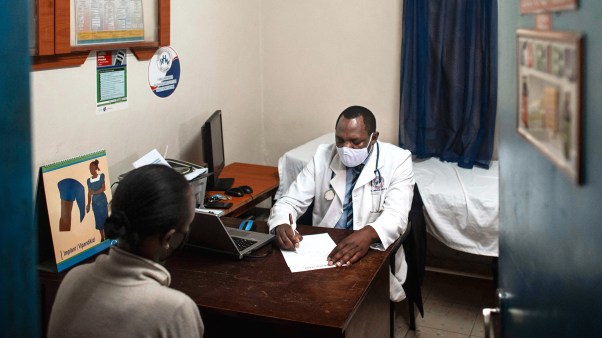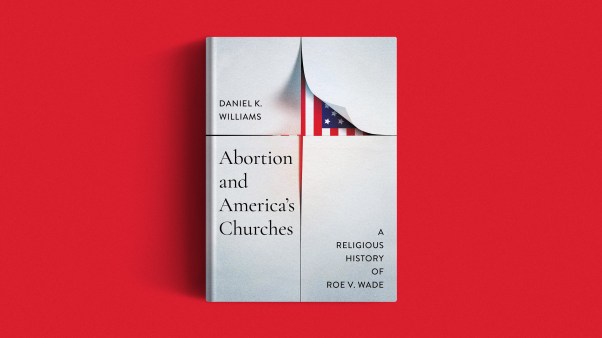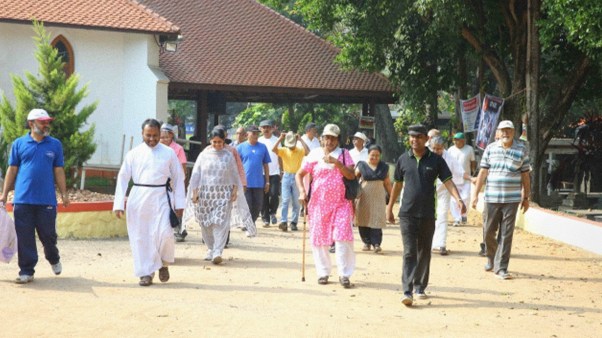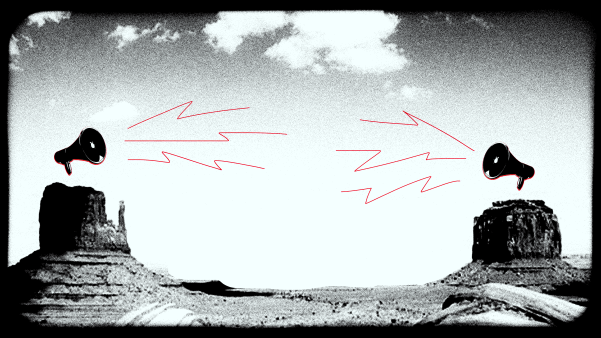A group of people were walking to and fro, from Mobile to New Orleans, and they fell into the hands of a robber named Katrina, who beat on them with waves and winds and floods, stripping them of everything they owned, leaving them half-dead in the New Orleans Superdome.
Now by chance, a journalist passed by with a television camera in hand. He took riveting shots of the victims so that viewers all over the world would know about the plight of these people. And when it was the journalist’s time to face the camera, he wondered, “Where is the government?”
Similarly, a group of local politicians came to that place. And when the journalist shoved a microphone in their faces, they angrily asked, “Where is the government?” They apparently had forgotten that due to corruption and political infighting, they had failed to adequately prepare their regions for what everyone knew was an inevitable catastrophe. But apparently they weren’t talking about their government.
Then along came the federal government, its President beating his breast confessing frankly that the government’s relief efforts indeed were “unacceptable.” Nonetheless, the creaky wheels of bureaucracy had finally started to churn. Food and supplies were finally making their way to the victims, National Guard troops were arriving to quell the bedlam, and engineers were making progress on the levees.
Finally, a bus pulled up beside the Superdome, and beckoned the victims to get in, which then drove 350 miles to the Houston Astrodome, to a scene that was anything but mud and muck. Nothing luxurious, to be sure, but clean and working plumbing and medical personnel, and plenty of food and water.
And a New York Times journalist, who noted that these victims had formerly been living in “all kinds of unbelievable filth, a screaming mess,” noted that they now sighed that “spending the night in a chair was not much better.”
“This is what they brought us to?” said one victim.
Yet, even before many victims had arrived at the Astrodome, the church leaders of Houston passed by that place. One member of Second Baptist, Jack Little, broke the bad news: “There is no money to do this, folks. There is no federal money available to handle this emergency in Houston.” Nor, he noted, was city, county, or state funding available.
And the people stood amazed. Others beat their breasts. But no one wailed. They just started adding up the needs.
In the Astrodome alone, each of three daily meal-line shifts needed 240 volunteers. The $1.75 daily cost of feeding each person, while sounding like a bargain, meant that it would cost $125,000 a day to feed the Astrodome refugees alone. One month of their meals would cost almost $4 million.
These are figures to test one’s mettle. Then Pastor Ed Young, of the 42,000-member Second Baptist, said his church was starting Operation Compassion. He pledged to raise $1 million for the relief efforts, as well as offer his church facilities for training classes for relief workers. Then he turned to the group and said, “All those sermons and passions you’ve generated, now’s the time to put up or shut up for every faith or religious community here. Are you willing to coordinate and cooperate with other people and other denominations? If you’re not, sit down.”
No one sat.
Then he said something even more shocking. As a pastor with many years of experience, he didn’t think of victims as mere abstractions. His church had a track record of helping people in desperate straits.
He knew that some of the needy would, with just a little help, bounce back quickly. These were always a pleasure to minister to. But some, with deep physical or psychological maladies, would never be able to fully take care of themselves. These were a challenge, but their condition was understandable. And then there were others still, people perfectly capable of bouncing back, of taking care of themselves, but who instead had chosen a lifestyle of dependency and complaint. This last group is nothing but trouble for ministries far and wide. And yet Young realized that all these people needed the compassion of Christ showered on them—even those who, like the nine lepers Jesus’ healed (Lk. 17), would remain forever ungrateful.
So Young said the most profoundly Christian thing he could say: “We’re in this thing for the long haul.”
And many marveled in wonder at these words, and some ran from that place in fear and trembling. Some just continued to mutter under their breath about who was to blame, not perceiving in their hearts that the time to call authorities to account was not at hand.
But others, when they heard these strange words, were moved with pity and started bandaging wounds, knowing that neither the gates of hell nor the fury of Katrina, nor the inefficiencies of government can stop the church from doing what it is called to do, now and for the long haul.
Copyright © 2005 Christianity Today. Click for reprint information.
Related Elsewhere:
Churches Try to Find Scattered Flocks, Assess Damage From Afar | With churches damaged and congregations dispersed, measuring Katrina’s impact has been nearly impossible.
A Church in Diaspora | A New Orleans pastor takes care of his scattered flock from Houston.
Earlier coverage of Katrina includes:
Amid the Evacuees | How churches in Houston, among other cities, began picking up the pieces. (Sept. 8, 2005)
I Was a Stranger | Ministry in the Astrodome and beyond. (Sept. 8, 2005)
The Sunday After | What Gulf churches were doing on the first Lord’s Day after Katrina. (Sept. 8, 2005)
Hurricane Weblog: In Every Thing Give Thanks | Even in tragedy, there is hope in Jesus. (Sept. 06, 2005)
Hurricane Weblog: Where Is God in the Chaos? | The theodicy questions change as human depravity rears its ugly head in New Orleans. (Sept 02, 2005)
Houston’s Religious Communities Scramble to Help Evacuees | “We’re in this thing for the long haul” without government money, church leaders warn. (Sept 02, 2005)
Hurricane Weblog: Little Relief in Sight | Food, water, supplies still making its way to hurricane victims. (Sept 01, 2005)
Hurricane Weblog: Katrina Relief Under Way | Louisiana Governor Kathleen Blanco declares








